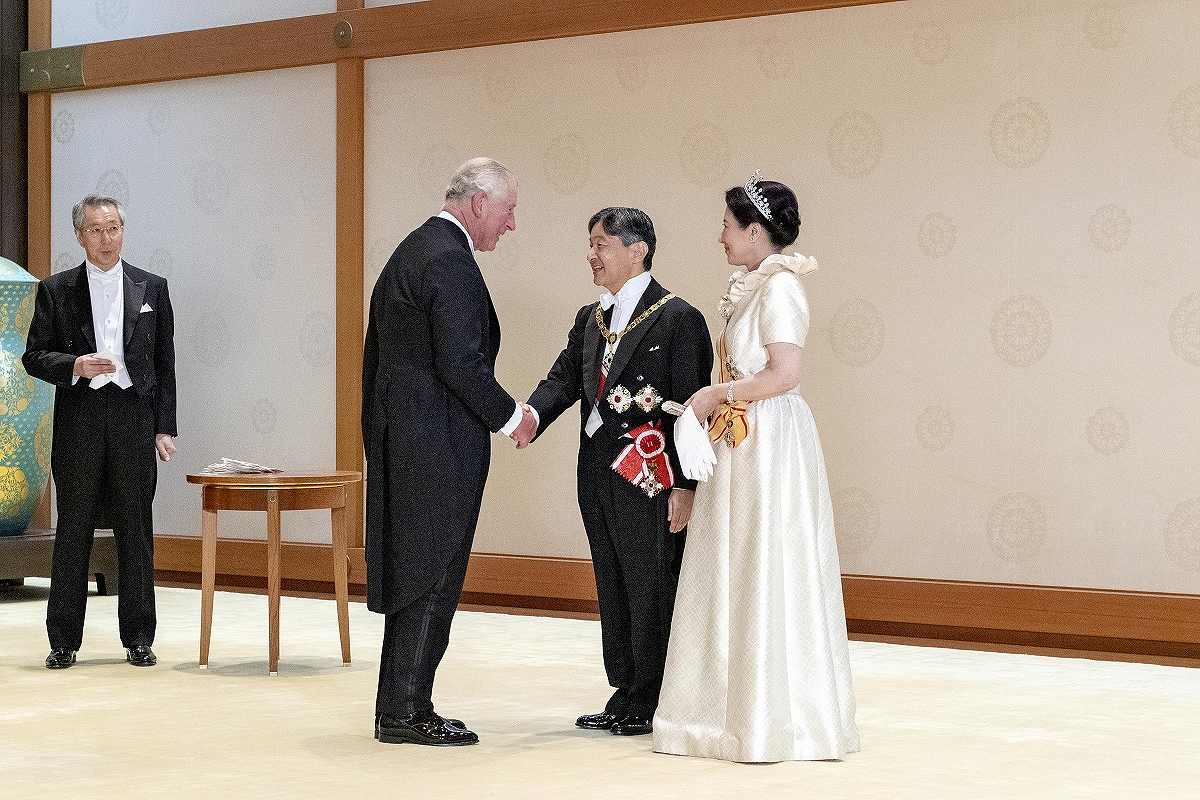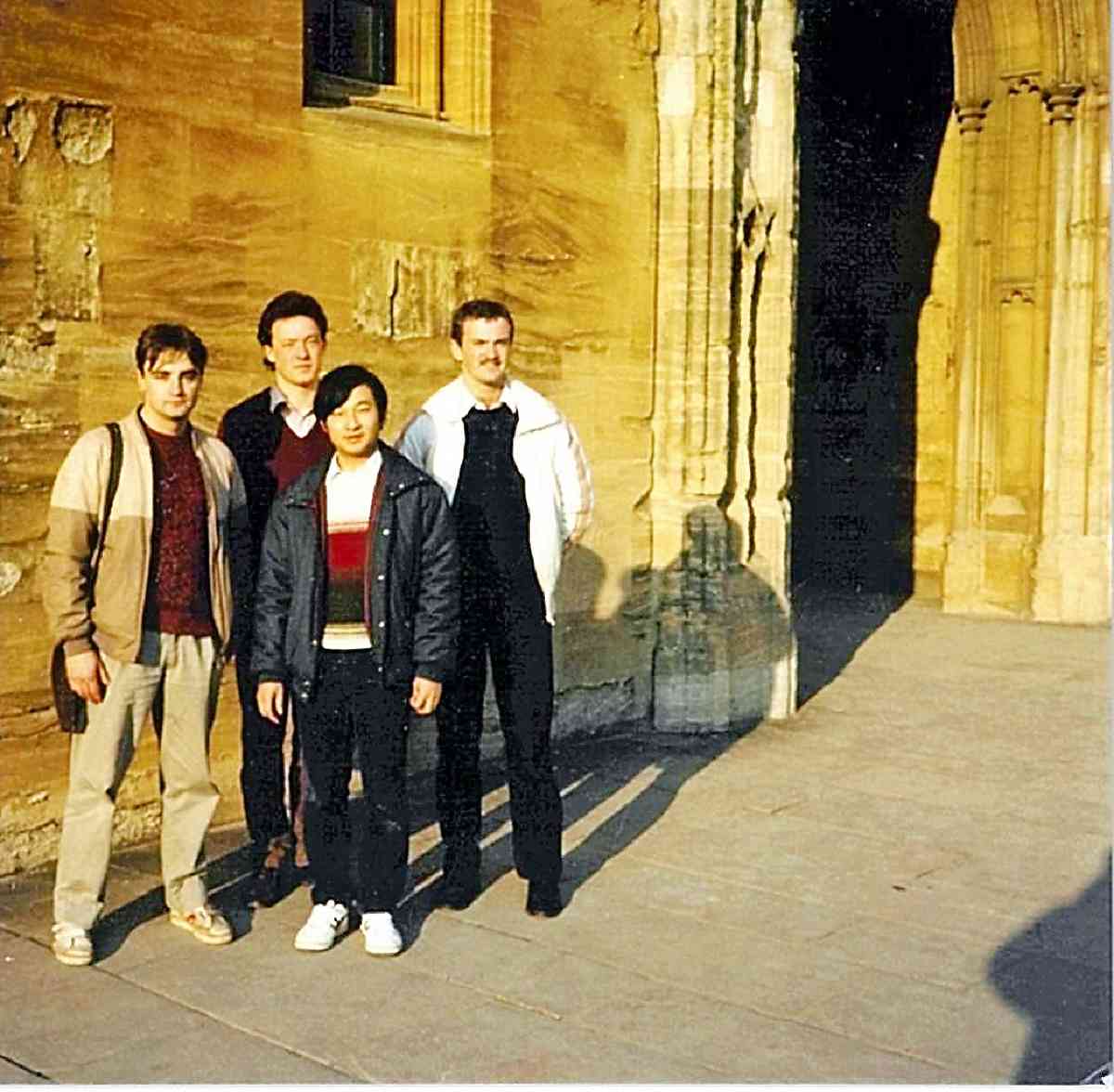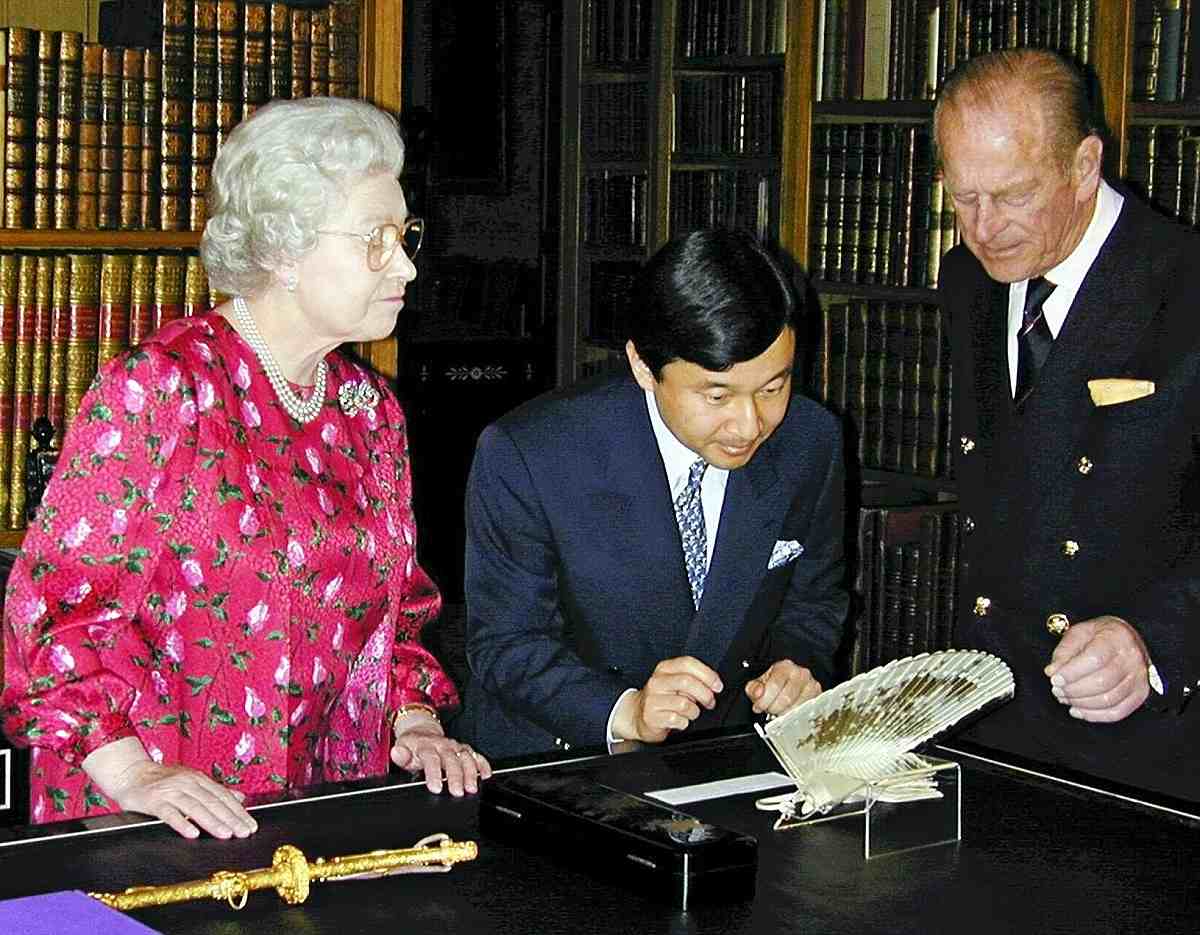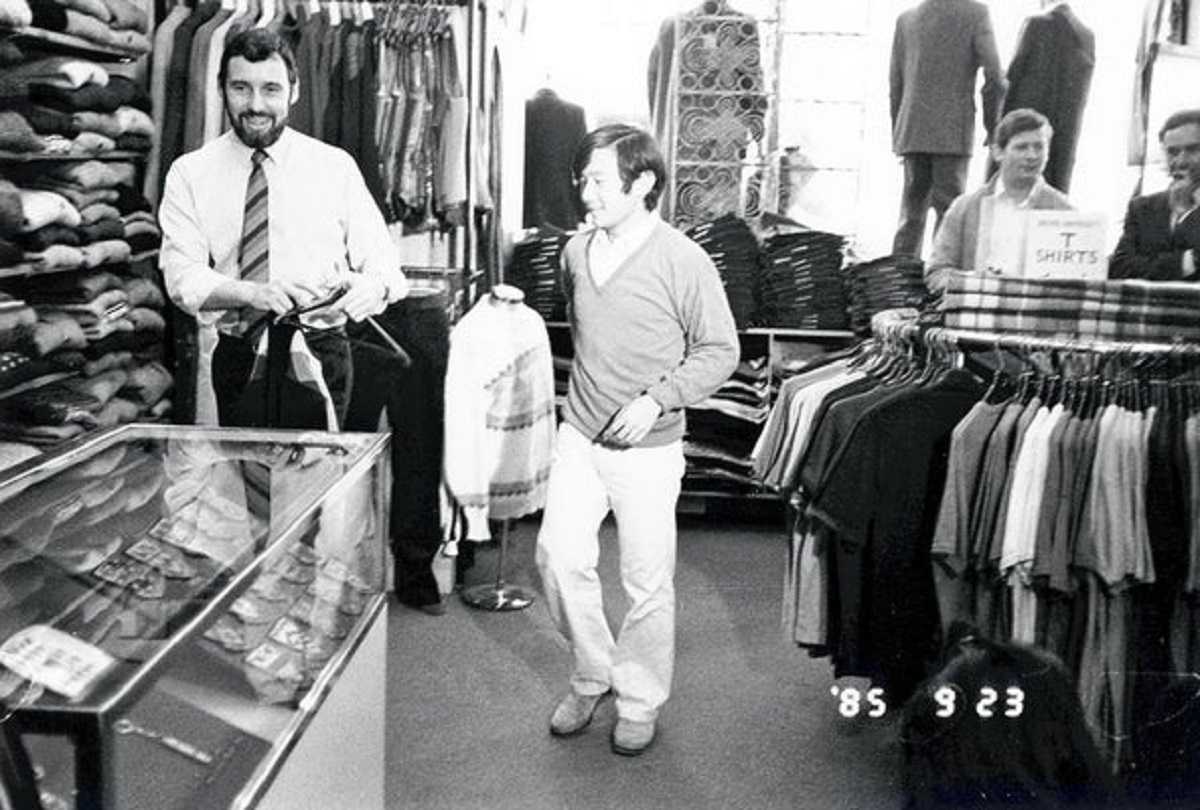Emperor’s Role in Japan-U.K. Ties / Long-standing Bilateral Relationship Woven by Imperial Family, Royal Family; Strength of Bond Demonstrated with Reconciliation after WWII

The Emperor, center, stands next to the Empress as he shakes hands with King Charles, then the Prince of Wales, at the ceremony of The Accession to the Throne at the Imperial Palace in October 2019.
By Takeshi Okimura / Yomiuri Shimbun Senior Writer
6:00 JST, June 23, 2024
The Emperor and Empress are visiting Britain as state guests from Saturday through June 29. This is the third and final installment in a series in which The Yomiuri Shimbun has traced the history between the Imperial family and the British royal family and learned about the Emperor’s thoughts and wishes.
***
When British Prime Minister Rishi Sunak suddenly announced on May 22 that he had asked King Charles III to dissolve the House of Commons, the British media reported: “Now is the moment for Britain to choose its future” and “Sunak gambles on snap poll.”
Sunak called a national election for July 4.
Local media have reported a possible change of government, with opinion polls showing much more support for the Labour Party than the prime minister’s Conservative Party.
The Emperor and Empress’ luncheon meeting with Sunak and his wife has been canceled.
“I’m worried that the election campaign will put a damper on their goodwill visit,” said a member of the Japan Society, a body in the United Kingdom dedicated to enhancing British-Japanese relations.
A foreign policy review following the possible change of government could lead to Britain being less involved in the Indo-Pacific region.
Yet, Prof. Antony Best of the London School of Economics and Political Science, who specializes in U.K.-Japanese relations, said it is during these times that people reflect on the significance of the relationship between the British royal family and the Imperial family, as they are separate from politics.
There is a bond between Japan and the United Kingdom that has been woven by the royal and Imperial families who have traveled back and forth between the two countries for more than 150 years. It is said the strength of this bond was demonstrated in the reconciliation process after World War II.
Each of the four emperors of the Meiji, Taisho, Showa and Heisei eras were awarded the Order of the Garter, Britain’s highest honor, by the British royal family. But in 1941, when the United Kingdom and Japan were at war, Britain rescinded the award for Emperor Showa.
When Princess Alexandra, a cousin of Queen Elizabeth II, became the first member of the royal family to visit Japan after the war, the United Kingdom allowed Emperor Showa to wear the Order of the Garter at a court banquet.
Ten years later, Emperor Showa was invited by the United Kingdom to visit the country as a state guest.
During a toast at dinner, the queen made a reference to the war, saying, “We cannot pretend that the relations between our two peoples have always been peaceful and friendly.”
Lord Louis Mountbatten, who led the war against Japan, did not attend the banquet but took the opportunity to meet privately with Emperor Showa. The British royal family tried to heal the rift by publicly acknowledging anti-Japanese sentiment while privately showing consideration toward the Imperial family.
The Emperor Emeritus also had to deal with the scars left behind from the war.
In 1998, the Emperor Emeritus and Empress Emerita made their first official visit to the United Kingdom since his accession to the throne.
Masahiro Sato, 83, a former chamberlain who accompanied them on their visit, said he saw people turn their backs toward the Imperial couple’s carriage procession as it headed to Buckingham Palace.
When Sato frowned at the sight, the then British ambassador to Japan, who was riding with him, told him to smile.
Japan and the United Kingdom shared the idea of promoting reconciliation. Whenever the Imperial couple saw a protest against them, the Emperor Emeritus looked at them and nodded.
“It was as if he was telling them that he understood how they felt,” Sato said.
Prof. William Horsley of the University of Sheffield, a former BBC Tokyo bureau chief, said that public opinion toward Japan became more positive in the United Kingdom due to the then Emperor continuously calling for peace until he abdicated.
Both the current Emperor and King Charles were born after World War II. But what will the relationship between the two countries look like in the future? And what will be its significance?
The Emperor revealed at a press conference on Wednesday that King Charles taught him how to fly fish while he was studying in the United Kingdom.
When the Emperor was crown prince and the king was the Prince of Wales, they danced the Awa Odori together at a goodwill event.
According to a former Imperial Household Agency official, the Emperor was greeting heads of state and royalty from around the world nearly every second during his enthronement ceremony five years ago.
“However, when the Emperor started having a conversation with the king, it showed the closeness between them,” he said.
Prof. Antony Best said that the relationship between the Imperial family and the British royal family, both of which have long histories and share democratic values, is significant at a time when authoritarian states that resort to violence are on the rise.
Best added that he is watching to see whether the Emperor will be presented with the Order of the Garter during his visit to the United Kingdom.
Related Articles
Most Read
Popular articles in the past 24 hours
-

Voters Using AI to Choose Candidates in Japan's Upcoming General ...
-

Japan's Snow-Clad Beauty: Camellia Flowers Seen in Winter Bloom a...
-

Monkey Strikes Junior High School Girl from Behind in Japan's Yam...
-

Genichiro Inokuma's Mural in Ueno Station That Gave Hope in Postw...
-

Senior Japanese Citizens Return to University to Gain Knowledge, ...
-

Foreign and Security Policy: Political Parties Must Discuss How T...
-

Heavy Snow Linked to 30 Deaths across Japan since Late Jan.; JMA ...
-

Tokyo Police Arrest Head of Resignation Assistance Firm
Popular articles in the past week
-

Japan Institute to Use Domestic Commercial Optical Lattice Clock ...
-

Australian Woman Dies After Mishap on Ski Lift in Nagano Prefectu...
-

Foreign Snowboarder in Serious Condition After Hanging in Midair ...
-

Chinese Embassy in Japan Reiterates Call for Chinese People to Re...
-

Narita Airport, Startup in Japan Demonstrate Machine to Compress ...
-

Toyota Motor Group Firm to Sell Clean Energy Greenhouses for Stra...
-

Sakie Yokota, Last Surviving Parent of a North Korea Abductee, Ur...
-

Beer Yeast Helps Save Labor, Water Use in Growing Rice; Govt Hope...
Popular articles in the past month
-

Univ. in Japan, Tokyo-Based Startup to Develop Satellite for Disa...
-

JAL, ANA Cancel Flights During 3-day Holiday Weekend due to Blizz...
-

China Confirmed to Be Operating Drilling Vessel Near Japan-China ...
-

China Eyes Rare Earth Foothold in Malaysia to Maintain Dominance,...
-

M6.2 Earthquake Hits Japan's Tottori, Shimane Prefectures; No Tsu...
-

Japan Institute to Use Domestic Commercial Optical Lattice Clock ...
-

Japan, Qatar Ministers Agree on Need for Stable Energy Supplies; ...
-

Japan, Italy to Boost LNG Cooperation; Aimed at Diversifying Japa...
Top Articles in Society
-

JAL, ANA Cancel Flights During 3-day Holiday Weekend due to Blizzard
-

Record-Breaking Snow Cripples Public Transport in Hokkaido; 7,000 People Stay Overnight at New Chitose Airport
-

Australian Woman Dies After Mishap on Ski Lift in Nagano Prefecture
-

Foreign Snowboarder in Serious Condition After Hanging in Midair from Chairlift in Nagano Prefecture
-

Train Services in Tokyo Resume Following Power Outage That Suspended Yamanote, Keihin-Tohoku Lines (Update 4)
JN ACCESS RANKING
-

Univ. in Japan, Tokyo-Based Startup to Develop Satellite for Disaster Prevention Measures, Bears
-

JAL, ANA Cancel Flights During 3-day Holiday Weekend due to Blizzard
-

China Confirmed to Be Operating Drilling Vessel Near Japan-China Median Line
-

China Eyes Rare Earth Foothold in Malaysia to Maintain Dominance, Counter Japan, U.S.
-

Japan Institute to Use Domestic Commercial Optical Lattice Clock to Set Japan Standard Time










